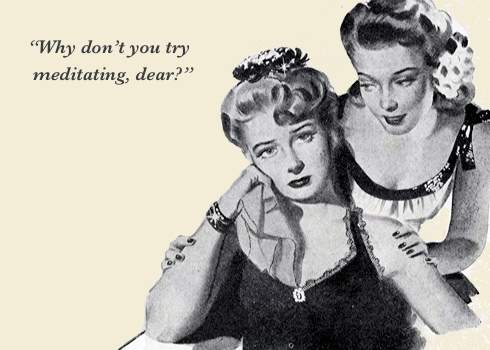Let’s face it—as women, we know that the days leading up to and including our periods can be a challenge. (Those who love us know it too.) Experts estimate that as many as 85 percent of us experience changes in mood and an influx of emotions, or Premenstrual Syndrome (PMS). Some of us experience physical discomfort and cramping. And a lot of us experience some combination of both mood changes and physical pain. Many of us turn to pills to ease the pain. For me, these painful sensations in my body had never been a place I thought to, or wanted to, bring my attention to. Until recently.
We all have areas in our lives where we resist “turning towards” the pain. Maybe the pain is in a relationship. Maybe it is a behavior that we do not want to look at. It could be a bad habit or something from the past, which is easier to just ignore. But it is there. And until we come to terms with it, it is just going to stay there. As a matter of fact, even if we come to terms with it, it might STILL be there. We must find a way to live with experiences, such as chronic pain, which seemingly cannot be “resolved.”
The word resolve itself comes from the Latin word “resolvere” which means to “unfasten, loosen, or release.” Loosening our fixed ideas about our experience, and being open to seeing anew is exactly what mindful awareness can help bring about. Mindfulness can bring about resolve, by helping us get some space between our fixed ideas about the way we perceive things, versus the way they actually are. We can discover a changed relationship with pain.
As gentle opportunities for learning and growth present themselves, a perfect lesson presented itself to me. Recently, my “day one” (first day of my period) fell on a day where I couldn’t just lie on the couch all day—I was committed to leading a mindfulness meditation retreat about an hour and a half away from home. Travel. Traffic. Needing to be present. Cramps. I had been looking forward to this retreat, but at the same time all I could feel was the painful squeezing sensation within my abdomen.
In preparation for the retreat, I spent a solid chunk of time practicing mindfulness. I decided to close my eyes and turn towards the sensations of my cramps and the emotional angst I felt inside. I asked myself—What exactly is going on? How exactly do the cramps feel? Where exactly do I experience them? Do they come and go or are they constant? Do they have a beginning, middle, and end? I watched the waves of my wanting to whimper and whine come and go. I watched the waves of pain as they came and went. I became a scientist examining my experience under a microscope.
By bringing mindful awareness to pain, we can discover so much. We may find that the physical sensation of the pain is one experience, and the emotional reaction that we have to the pain is a completely different experience. It is possible that the emotional reaction can even make the pain feel worse, as we tighten and tense around the painful area.
Working with menstrual cramps and PMS symptoms is no exception. The physical sensation can be one experience, and the emotional response to that sensation can be another experience. In my case, when I focused on the physical sensation of cramps, the emotional response seemed to just disappear. And when I focused on my intense emotions, the physical sensations lessened. Overall, by watching my experience as an impartial observer, the cramps and crankiness both diminished significantly.
Any experience can be our teacher, if we are open to it. If we as women have a unique opportunity each month to strengthen our mindfulness practice, let this time be a sacred space for us. Set aside some time to formally practice mindfulness during the pre-menstrual part and during the height of your menstrual cycle. Experiment with “turning towards” those cramps and/or changes in mood. There is much that can be learned through PMS—a Perfect Meditation Space, that is.
Corinne Zupko, Ed.S., M.A. is a Licensed Professional Counselor, Board Certified Coach, keynote speaker, and Mindfulness-Based Stress Reduction teacher. She is an adjunct faculty member at The College of New Jersey where she teaches classes in mindfulness and wellness practices.






